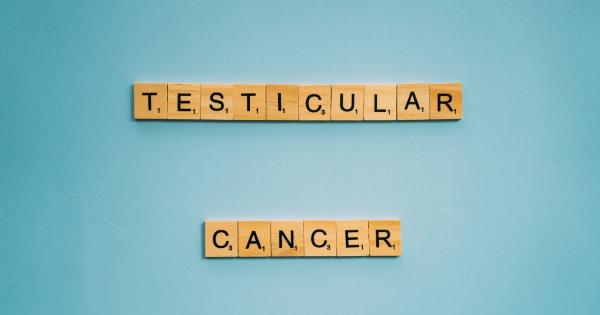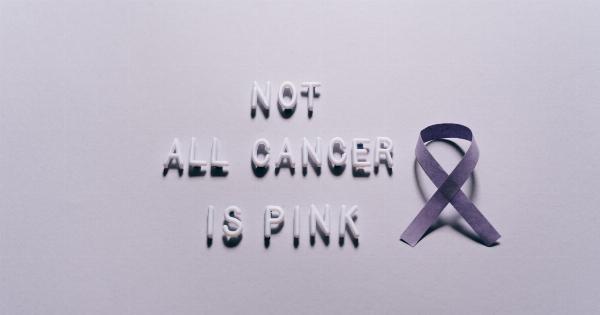Testicular cancer is a type of cancer that affects the testicles – the two oval-shaped glands that sit in the scrotum, just underneath the penis.
It’s a relatively rare form of cancer, accounting for just 1% of all male cancers, but it’s important to be aware of the symptoms and risk factors, as early diagnosis and treatment can greatly improve the outcome for those affected.
What causes testicular cancer?
Like many types of cancer, the exact causes of testicular cancer are not fully understood, but there are several risk factors that may increase the likelihood of developing the disease. These include:.
- A family history of testicular cancer – if your father or brother has had testicular cancer, you’re more likely to develop it
- Age – testicular cancer is more common in younger men, with around half of cases diagnosed in those aged 20-24
- An undescended testicle – if one or both testicles fail to descend from the abdomen down into the scrotum during early development, the risk of testicular cancer is increased
- HIV – men with HIV have a higher risk of developing testicular cancer
- Exposure to certain chemicals – some studies have suggested that exposure to chemicals such as pesticides, herbicides and certain plastics may increase the risk of testicular cancer
It’s worth noting that having one or more of these risk factors does not necessarily mean that you will develop testicular cancer, and conversely, some cases of testicular cancer occur in men with no known risk factors.
What are the symptoms of testicular cancer?
The most common symptom of testicular cancer is a lump or swelling on one testicle. This may be painless, and in some cases, the lump may be small and difficult to feel.
However, if you notice any changes in the size or shape of your testicles, it’s important to speak to your doctor, as early diagnosis and treatment can greatly improve the outcome.
Other symptoms of testicular cancer may include:.
- Pain or discomfort in the testicle, scrotum or lower abdomen
- A feeling of heaviness or aching in the affected testicle
- Swelling or lumps in the lymph nodes in the groin
- Back pain (in rare cases, testicular cancer can spread to the lymph nodes in the back)
If you experience any of these symptoms, it’s important to speak to your doctor as soon as possible.
While these symptoms may not necessarily be indicative of testicular cancer, they may be a sign of another health issue, so it’s always worth getting them checked out.
How is testicular cancer diagnosed?
If your doctor suspects that you may have testicular cancer, they may refer you for further tests. These may include:.
- A physical examination – your doctor will examine your testicles and may also check your abdomen, inguinal area (the area between your abdomen and thigh) and lymph nodes for swelling or lumps
- An ultrasound scan – this uses high-frequency sound waves to produce an image of the affected testicle and surrounding tissues
- Blood tests – these are used to check for the presence of certain proteins that can indicate testicular cancer
- A biopsy – in rare cases, a small sample of tissue may be taken from the affected testicle and examined under a microscope to check for cancer cells
If you are diagnosed with testicular cancer, your doctor will advise you on the most appropriate treatment based on the type and stage of your cancer.
What are the treatment options for testicular cancer?
There are several treatment options for testicular cancer, which may be used alone or in combination:.
- Surgery – in most cases, the affected testicle will be removed via a procedure called an orchidectomy. If the cancer has spread to other parts of the body, surgery may also be used to remove affected tissues
- Chemotherapy – this uses drugs to kill cancer cells. It may be used before or after surgery, or as the primary treatment if the cancer has spread to other parts of the body
- Radiation therapy – this uses high-energy radiation to destroy cancer cells. It’s often used if the cancer has spread to the lymph nodes in the abdomen or pelvis
- Surveillance – in some cases, your doctor may recommend a ‘wait and see’ approach if the cancer is small and hasn’t spread. In these cases, regular check-ups will be arranged to monitor the cancer’s progress
The most appropriate treatment will depend on several factors, including the type and stage of the cancer, the age and overall health of the patient, and any other medical issues that they may have.
Conclusion
Testicular cancer is a relatively rare form of cancer, but it’s important to be aware of the symptoms and risk factors, as early diagnosis and treatment can greatly improve the outcome for those affected.
If you notice any changes in the size or shape of your testicles, or experience any other symptoms such as pain or discomfort, it’s important to speak to your doctor as soon as possible. With the right treatment, most cases of testicular cancer can be successfully treated, and many men go on to lead long and healthy lives.


























